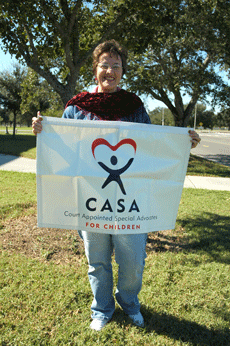Tina Granger, legal assistant studies and sociology junior from Houma, volunteers as an advocate for neglected and abused children for Court Appointed Special Advocate of Terrebonne.
Q: What is CASA?
A: “CASA is a parish-by-parish court program that appoints a volunteer advocate to represent a child’s best interests concerning shelter and social and educational options. With our combined efforts with the Office of Community Services, we insure a stable environment for a child. Our continued presence in a child’s life allows a child to have a feeling of security in a world that is rapidly changing.”
Q: Why and when did you decide to volunteer?
A: “My first semester I took legal research, and my professor introduced me to the idea of getting involved in CASA because I was so passionate about the case interview I was working on dealing with a juvenile. I took my first case in February.
Q: Who can volunteer?
A: “Anyone can volunteer as long as he or she is 21 years old or older.
Q: Does CASA provide training?
A: “Yes, they provide very thorough training that is on-going throughout the year with many dimensions addressing a child’s life from all walks of life.”
Q: How do you become a volunteer?
A: “Someone interested in becoming a CASA volunteer should contact his or her parish CASA office to begin the application process. There will be a background check and a six week training class, and after the class is completed, a judge swears in all new CASA volunteers.”
Q: What does being a volunteer involve?
A: “Volunteering for CASA takes an average of about three to five hours a month of your time. You make phone contacts with your child and face-to-face visits, discover what is important in the child’s life, whether that involves visiting with family members or providing horseback riding for a child. You want to make simple pleasures a reality. You are also involved in overseeing the necessities in keeping up with the child’s medical health by overseeing OCS’s case plan.”
Q: Why should someone volunteer?
A: “Someone should volunteer if he or she is concerned about his or her community and the environment children are allowed to stay in when they are suffering. They should volunteer if they want the opportunity to make a difference in a child’s life.”
Q: Does CASA always need volunteers?
A: “Yes, the need is very great. Many of our advocates have two and three children they advocate for.”
Q: Does CASA involvement really make a difference in a child’s life?
A: “Yes. This is due to the personal relationship that a CASA advocate develops with his or her child.”
Q: Do you enjoy being a CASA volunteer?
A: “I do enjoy being a volunteer. The experience of bringing hope to a child’s life and the knowledge of the safety, stability and friendship given to a child by being a CASA advocate is enjoyable. These three things make children feel secure even when their world has fallen apart.








